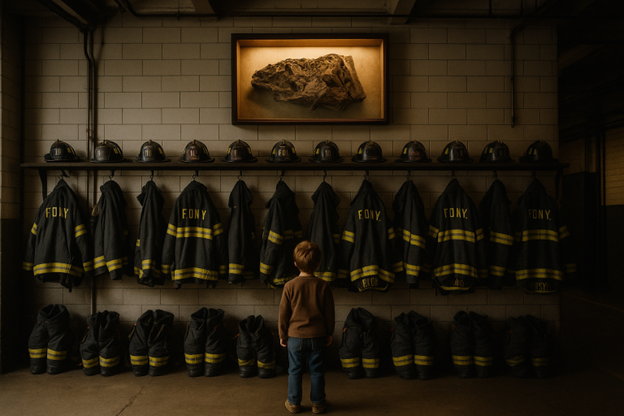Brian Quinn spent seven years as a New York City firefighter before cameras ever found him. He responded to calls with Engine Company 166 and Ladder Company 86 in Staten Island, learning what it meant to be part of the FDNY’s legendary brotherhood. Now, decades later, he’s found a different way to serve those families—by helping their children cope with trauma they never asked for.
At Friends of Firefighters’ 2024 Annual Gala, Quinn helped raise funds for Bravest Children, a new program addressing an often-overlooked consequence of September 11th: the psychological burden carried by firefighters’ kids. These are children who’ve watched their parents struggle with illness, depression, and the slow-motion fallout of toxic exposure at Ground Zero.
“Caring for firefighters also means caring for their families,” Quinn told supporters that evening.
A tragedy that never ended
The statistics tell a sobering story. More FDNY members have now died from 9/11-related illnesses than perished in the attacks themselves/ Cancers, respiratory diseases, and chronic conditions appeared years—sometimes decades—after firefighters spent months working the pile at Ground Zero. Their children grew up watching parents who seemed healthy one day face devastating diagnoses the next.
Robert Tilearcio Jr. lost his father to brain cancer linked to cleanup duty. Victoria Estreicher’s father died from toxic exposure complications, prompting her to co-found the Live Rich Foundation in his memory. These families represent thousands more navigating the same painful reality: 9/11 didn’t end on September 11th.
Research shows that children absorb their parents’ trauma in ways that mirror PTSD—anxiety, depression, hypervigilance. It’s called secondary traumatic stress, and it can shape a child’s emotional development just as profoundly as experiencing the event firsthand.
What Bravest Children actually does
Launched in late 2024, Bravest Children takes a different approach to healing. Licensed counselors trained in childhood trauma lead sessions using play therapy, art, and group activities—tools that help kids express feelings they don’t yet have words for. A therapy dog in training sometimes joins sessions, offering the kind of comfort only an animal can provide.
The program treats the whole family. While children work through their emotions in one room, parents receive counseling simultaneously. It’s designed to break the cycle of inherited trauma before it hardens into something permanent.
Within weeks of opening, enrollment exceeded expectations. Clearly, there was a need no one had fully addressed. All services are offered at the organization’s Red Hook facility—the same place where firefighters gather for weekly breakfasts and peer support meetings. It’s familiar territory, which matters when asking families to open up about their hardest moments.
Why Quinn’s voice carries weight
Quinn’s involvement isn’t a celebrity photo op. His years with the FDNY give him credibility in firehouses where asking for help has historically been seen as weakness. When someone who lived that culture speaks openly about depression and counseling, it shifts the conversation.
“Being a firefighter was a calling,” he told Fox News. “Through Friends of Firefighters, I’ve found a new way to fulfill that calling—supporting the health and resilience of New York’s Bravest long after the fires are out.”
Quinn sits on the organization’s advisory council, participates in firehouse outreach, and donates meet-and-greet experiences for charity auctions. His entertainment career connects Friends of Firefighters with donors and audiences far beyond the FDNY network. The organization reports increased service use among younger firefighters since Quinn joined—proof that visibility matters when you’re trying to change a culture.
During an October 2024 Forbes interview, Quinn explained why outside organizations like Friends of Firefighters are essential: they offer confidentiality and family participation in ways department systems sometimes can’t.
The long road ahead
Medical monitoring continues uncovering new 9/11-related conditions more than twenty years later. Thousands of firefighters have retired on disability. Their children—many now teenagers or young adults—cycle through worry, caregiver fatigue, and anticipatory grief as parents face recurring treatments.
Bravest Children prepares families for that long haul. Group activities teach emotional literacy and coping skills kids can use when the next health crisis hits. By addressing the entire family system, the program ensures support doesn’t evaporate when attention fades.
A 2023 clinical review found that most PTSD interventions for first responder families focus on spouses, leaving children underserved. Friends of Firefighters’ model fills that gap and offers a blueprint other cities can replicate.
Quinn’s message to these families is simple but profound: healing doesn’t have to happen alone. It can be communal, compassionate, and continuous—for as long as it takes.
For thousands still living with September 11th’s aftermath, that might be the most important thing anyone could say.
“Everybody loves firefighters,” Quinn said in an Instagram video. “They’re the closest thing we have to superheroes, and everybody appreciates firefighters. But I’m going to ask you to take a step further with me. Friends of Firefighters is a pure nonprofit. Every dollar raised goes to help members of FDNY in ways that are important, like mental health counseling, wellness services and critical services for firefighter men, women, and their families.”






Click here to change your cookie preferences